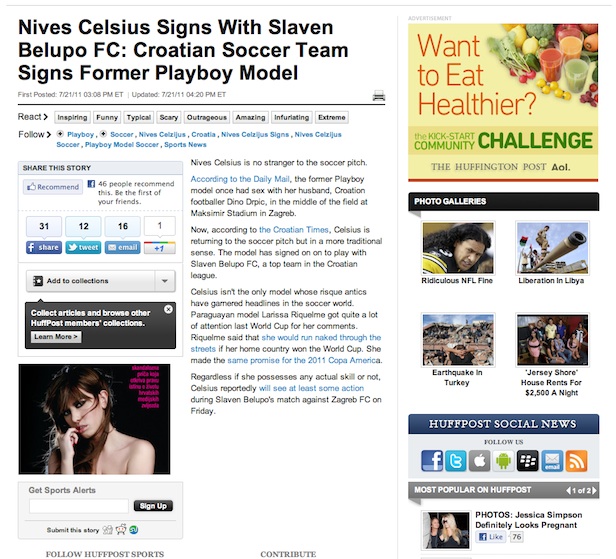Uncategorized

The Last Generation With Backpacks – The End of Print Media?
I recently read this very interesting article on CNN Money, on the introduction of iPads as well as the “one computer per child” concept into today’s schools.
The article cited research that was quite eye-opening in regards to the digitization of modern schools.
A recent survey of 25 educational technology directors at a conference on integrating technology in the classroom found some interesting results regarding digital computing in the classroom.
The findings included:
- 100% of schools were testing or deploying iPads in their schools. 0% were testing or deploying Android tablets
- Their schools currently have an average of one computer for every 10 students
- Nearly half (12) expect to eventually deploy one computer per child; two of their schools already do
- More than a third (9) expect to deploy one tablet per child; 16% within the next 5 years; one school already does
Given the huge problems facing America’s schools, this is a slender thread on which to base a vision of broad educational reform. But these trends represent a profound shift in how students will be educated in the years and decades ahead. It also highlights the absolute need for the strongest web presence possible for businesses that wish to succeed with these students as they grow into adulthood.
Piper Jaffray’s Gene Munster, who conducted the survey, quotes outgoing Apple retail chief Ron Johnson, who has suggested that the current crop of students might be “the last generation with backpacks.”
It’s common wisdom to assume that digital technology and the Web will become ubiquitous sometime in the future, but these latest findings clearly show that the complete replacement of all print copy can already be seen on the horizon.
In addition to the classroom, the plummeting rate of magazine and newsprint subscriptions, and the steady decreases in the purchase of physical books thanks to various e-readers and smart phones, point directly to a time in the near future when print becomes completely obsolete. As these students mature they will have very little exposure to printed materials in general, making this communication and advertising medium a relic of a not-so-distant past.
The takeaway is:
There has never been a more critical time to focus time and resources towards your overall web presence, the SEO rankings of your website, and the creation of social media campaigns for your company.
The very survival of your business may depend on these factors far more quickly than you have recognized, or addressed.

Should You Have To Pay To Link?
0Central European News Apparently Thinks So
First, we aren’t talking about links you pay for in relation to search here. This discussion is about paying a publication to link to their web content – as if you are purchasing the right to re-publish it.
Central European News (CEN) is an online media company that publishes news, images, research, and more to a range of other media outlets for a fee.
PressGazette’s Andrew Pugh ran an interesting story about the The Huffington Post linking to sources like The Daily Mail, which had paid for content from CEN. CEN decided to send payment invoices to The Huffington Post, and they were paid for by the Huffington Post. CEN then encouraged other content providers to follow their lead, and send invoices to the Huffington Post as well. The concept here is that other publications would be compensated for The Huffington Post linking to them.
Interesting position for sure, but the problem is that The Huffington Post didn’t mean to pay the invoice, as was revealed in a followup to Pugh’s original post. They use CEN as one of their photo providers, and do pay for those services, so mistook these invoices as being related to that. So anyone who wishes to bill the Huffington Post for linking to their content might think twice about the probability that they’ll actually receive payment.
The real question here is: should The Huffington Post (or any other site/blog) have to pay the creator of original content to link to their content?
Keep in mind that the The Huffington Post LINKED to the content, as opposed to publishing it. It’s a link referencing the content…not a copy of the full article.
According to the logic expressed by CEN it’s a violation of copyright if a publication even uses the original content as a starting point. So, by this logic, for example, if Publication A was the first to report on Occupy Wall Street protesters clashing with police in Atlanta, it would then be a violation for publications B, C, D, and E, to report that Publication A was the outlet reporting this news. Publication B could not say, “Publication A is reporting that police have confronted protesters in Atlanta, but we have yet to confirm this.”
So, if one publication was able to get a source of their own with that information, but nobody else was able to, publications B, C, D, E, etc. would not even be able to mention that one publication was reporting on the event. The world would have to already be reading publication A to even know about the death, or at least reading publication G, H, or I, which are paying a fee to Publication A for the rights to reprint.
Nevermind that it’s entirely possible that Publication A is not even a service that charges publications for reprints, because it’s entirely possible that Publication A could be a simple blog, or even somebody’s Facebook account. News is not just reported by traditional means anymore. That’s just the reality of today’s Internet.
Let’s look at one of the Huffington Post examples referenced in Pugh’s piece:
You can see that while the piece is not an incredibly lengthy, in depth piece, it does link to five different pages to pull together its story. This is in and of itself an indication that the piece is not a total rewrite of one article, but is drawing on references from various sources (including the Huffington Post’s own content). If you actually click through to those other articles, you can also see that this is not a straight re-write of any one piece.
As often as the law (at least in this country) has ruled on the side of “fair use”, it’s hard to believe The Huffington Post is legally in the wrong here, though I’m certainly not a lawyer, and CEN is obviously not based in the U.S.
It seems like CEN wants people to pay to link to their content, but if you’re paying, why wouldn’t you just post the whole article?
And of course CEN would by extension need to pay for their OWN links to other content. Either way, to impede linking would create a dangerous precedent. If websites are required to pay every time they want to reference a piece of information, it’s bound to not only create more situations where web content providers simply go uncredited, but it’s also likely to stifle a lot of valuable content from being created in the first place.
If one publication has information that is indeed first-hand news, or shares some insight that has not previously expressed, but only makes sense in the context of another piece of information that has already been published by a different publication, they need to reference that piece. It simply doesn’t make sense to have to pay to point to freely available information, in my own humble opinion. But you may disagree. That’s just the way the web works. The web is based on links. Without links, it’s not a “web”.
While the HuffPost piece in question is not some hugely important piece of web content, who decides where the line is?

The Many Benefits of Content Marketing
0Content marketing is becoming one of the most widely used forms of promotional strategies on the web today. It is cost-effective way to reach a wide audience base, yet it is not as easy as submitting a simple pay per click ad.
Content marketing is relatively cheap compared to most other options, but it requires you to invest your time, effort and a lot of patience before you can reap its returns. This is one of the reasons why many people are not sold to the idea that using content online is a good way to market their products and services. For those that do understand the true long-term value of web content, they have found ways to create it themselves or work with someone who can.
For those who are still uncertain about the advantages of content marketing, here are five factors that make content marketing such an effective online marketing strategy:
It’s cost-effective
Other forms of marketing need you to invest your fortune. In content marketing, it only needs time and effort to have your website, products or services promoted online if you are doing the work yourself. Working with an outside writer to create your content can also be very cost effective.
It lasts FAR longer than other advertising methods
On top of its being economical, your content stays on the web for an indefinite period, and continues to drive traffic long after your content has been published. Other methods of marketing get exposure as only for as long as you have the finances to support it. This is huge benefit when considering ROI for your marketing dollars.
It helps to build credibility
By consistently sharing helpful information on the web, you are actually making your content work for you because it gradually builds your reputation online. Over time, people will see you as an expert in the field that you are writing about. As your credibility grows, you will be able to establish trust. Trust is a big thing in business, as credibility matters very much in marketing.
It attracts traffic
Content marketing is intended to attract an audience with a certain degree of interest on your niche. These people will also be the ones who will visit your website to know more of what you have in there for them. Content which is focused on facts and solutions pertaining to the products or services it promotes will surely attract traffic.
It builds up your site’s SEO
By consistently publishing content, you are actually attracting search engines too. Search engines are always on the lookout for fresh content they can rank. Content which are infused with effective keywords will always catch the attention of search engines, moving you up in the rankings and bringing quality visitors interested in your services and products to your website. Great content also creates good links back to your site as other people share your information.
These are the primary reasons that web content marketing is so effective in promoting your business.
If web content writing and posting isn’t something you can (or want to!) do for yourself, consider hiring someone who can help you build your online content to reap the many rewards detailed above.
Contact me if you’d like to know a bit more about the potential content solutions that we provide, or conduct your own searches and see what options are available to you.
Whatever route you choose, for the health of your business – begin creating and sharing high-quality web content today!





